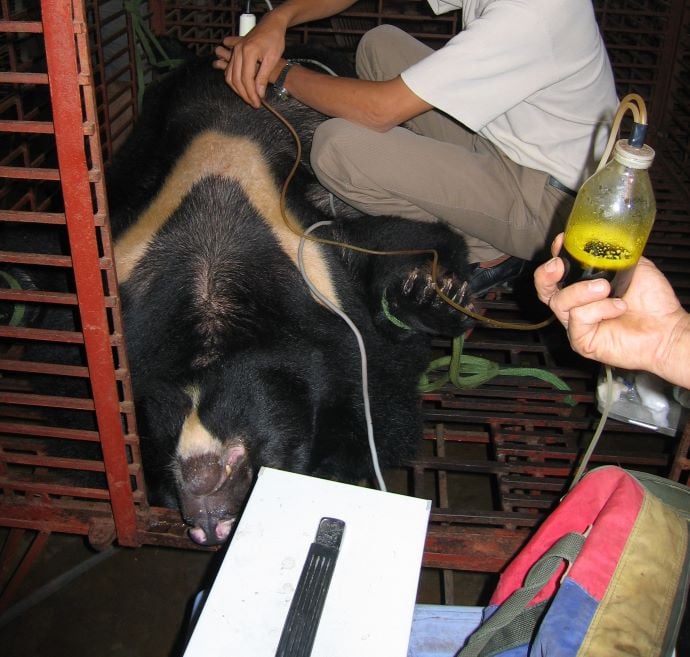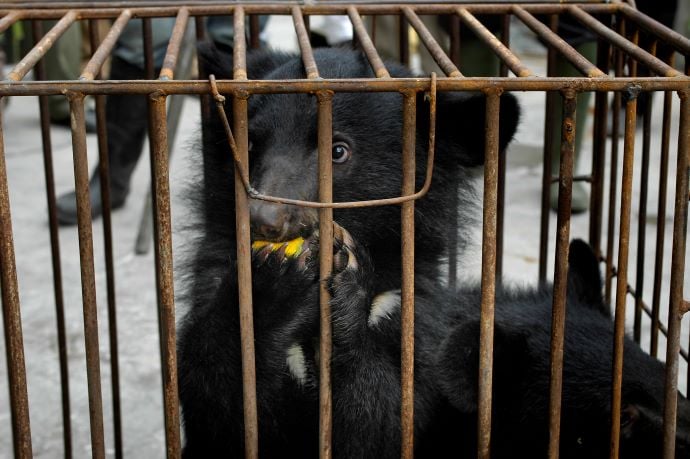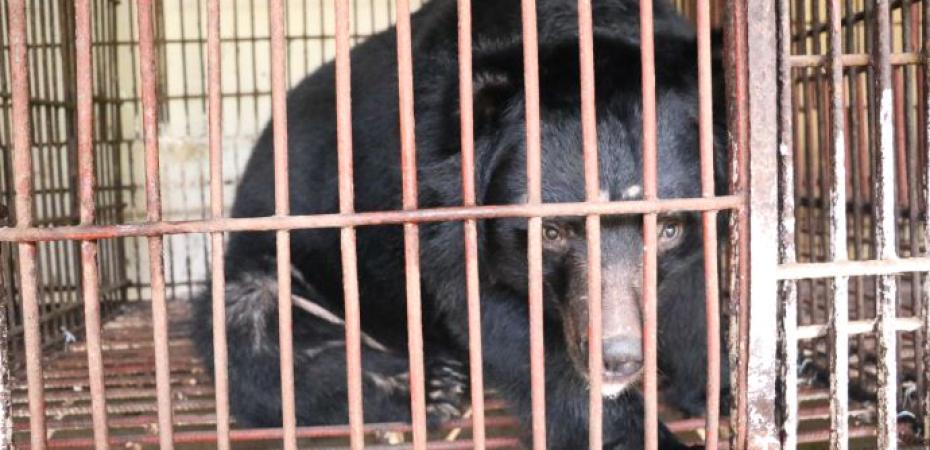Facts about bear bile farming
1. Bear bile does have medicinal uses
Bear bile has been used for thousands of years in traditional Asian medicine. It contains high levels of ursodeoxycholic acid (UDCA) known to be useful for treating liver and gall bladder conditions. Sold in the form of powder, tonic or pills, bear bile is considered to be a 'cure' for a range of ailments from acne, hangovers, colds, sore-throats, haemorrhoids, conjunctivitis and even cancer. It’s also used in ordinary household products and cosmetics like shampoo and toothpaste. It’s even used in wine, and 'bile teas'.
2. Extracting bile from bears is as cruel and painful as you would imagine
The extraction of bear bile from live bears causes unimaginable physical and psychological suffering and long-term health problems.
While extraction methods vary, all bears live in tiny cages for the duration of their time on bile farms. Bears grow up in these tiny cages to the point where their bodies have contorted to fit the bars. Most have missing and damaged teeth from trying to gnaw their way out. Crush cages and full metal jackets are now illegal in China, but are still likely to be used on poorer farms.

Some farms in China have breeding programs, but many bears are poached from the wild as cubs. They are stolen from their mothers and likely witness her being killed by the poachers as she tries to protect them. Most of these cubs are never released and can suffer up to 30 years of continuous pain by bile extraction.

Most farmed bears are starved and dehydrated as this can encourage bile production. Because of the unnatural and unhygienic conditions they are forced to live in, many also suffer from multiple diseases and malignant tumours that ultimately kill them.
3. There are alternatives to bear bile
There are over 50 herbal alternatives and many inexpensive synthetic alternatives to bear bile. Animals Asia engages with the traditional medicine community and users of bear bile to promote alternatives and reduce demand through our Healing without Harm campaign. We published and distributed a free booklet, Herbal Alternatives to Bear Bile across Vietnam and a guide to growing and maintaining herbal alternatives at home and collaborated with the Traditional Medical Association in Vietnam to create a herbal alternative to bear bile which we regularly hand out for free at community events.

Our work with local schools and communities has seen 13 herbal gardens flourishing across the country in Vietnam.
%20690.jpg)
Kai Bao, the biggest single buyer of bear bile in China, is pursuing research into bear bile alternatives with government backing. And the Xian Traditional Chinese Medicine Hospital’s Department of Ophthalmology has launched the Bear Bile Powder for the Treatment of Acute Conjunctivitis (Liver Meridian Fiery Heat Syndrome) with artificial bear bile powder project. These actions along with other findings suggest that demand for bear bile is reducing.

4. Bear bile farming is legal in China but not in Vietnam
In Vietnam, bear bile farming has been illegal since 1992 but has persisted due to legal loopholes and continued demand. However, through decades of rescues and campaigning, Animals Asia has earned the trust of the Vietnam government and has been named their official partner in working to completely end the industry in the country. Animals Asia and the Vietnam government will rescue every bear and close every farm in the coming years.

5. We won’t stop until bear bile farming ends for good
Since its inception in 1998 Animals Asia has continuously campaigned to end bear bile farming. We have rescued hundreds of bears in Vietnam and China from bear bile farms and are absolutely committed to ending this inhumane trade forever.
%20x%20690.jpg)
Help us end bear bile farming
Join the global movement working to consign bear bile farming to the history books and together we will change the world for thousands of bears who are in desperate need of our help.


